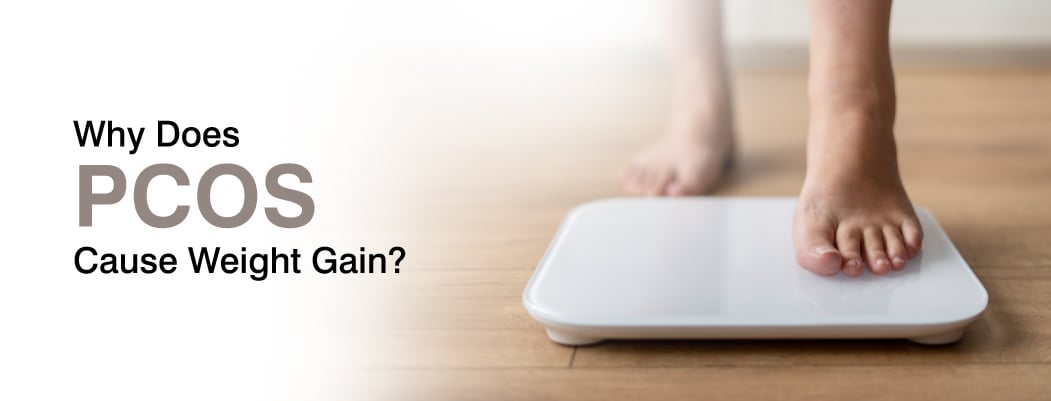How to lose weight with pcos
June 21, 2023

What is PCOS?
PCOS stands for Polycystic Ovary Syndrome. It is a common hormonal disorder that affects women of reproductive age. PCOS is characterised by symptoms, including irregular menstrual periods, excess androgen (male hormone) levels, and cysts on the ovaries.
While the exact cause of PCOS is not known, it is believed to involve a combination of genetic and environmental factors. One of the main underlying issues in PCOS is insulin resistance, where the body has difficulty using insulin effectively. This leads to high levels of insulin in the blood, which can disrupt the normal hormonal balance in the body.
What are the symptoms of PCOS?
Women with PCOS may experience a range of symptoms, including:
- Irregular or absent menstrual periods: Women with PCOS may have infrequent or prolonged menstrual cycles or may even experience a lack of menstruation altogether.
- Excess androgen levels: Elevated levels of androgens, such as testosterone, can cause symptoms like acne, excessive hair growth (hirsutism), and male-pattern baldness.
- Polycystic ovaries: The ovaries may develop small cysts, which are fluid-filled sacs, and can be seen on ultrasound examinations. However, not all women with PCOS have cysts, and the presence of cysts alone does not confirm the diagnosis of PCOS.
- Weight gain: Many women with PCOS struggle with weight gain or find it difficult to lose weight. This is often linked to insulin resistance and hormonal imbalances.
- Fertility issues: PCOS is a leading cause of female infertility. Irregular ovulation or the lack of ovulation can make it challenging for women with PCOS to conceive.
- Other symptoms: Women with PCOS may experience mood swings, fatigue, sleep disturbances, and skin changes like darkening of the skin in certain areas, such as the neck and armpits.
It’s important to note that the symptoms and severity of PCOS can vary among individuals. Diagnosis is typically made based on the presence of specific criteria, including the presence of irregular periods, elevated androgen levels, and polycystic ovaries observed through ultrasound imaging
Why Does Polycystic Ovary Syndrome Cause Weight Gain?
Polycystic ovary syndrome affects how your body processes insulin, a hormone responsible for regulating blood sugar levels. In PCOS, the body becomes resistant to insulin, resulting in high insulin levels in the blood. This insulin resistance can lead to weight gain through various mechanisms:
- Increased Appetite: Insulin resistance can trigger increased hunger and cravings, causing individuals with PCOS to consume more calories than they need.
- Hormonal Imbalances: PCOS disrupts the balance of reproductive hormones, such as estrogen, progesterone, and testosterone. Hormonal imbalances can lead to weight gain, particularly in the abdominal area.
- Slowed Metabolism: Some women with PCOS may experience a slower metabolic rate, making it easier to gain weight and harder to lose it.
What Are the Risks Associated with PCOS-Related Weight Gain?
PCOS-related weight gain poses several health risks, emphasising the importance of managing weight effectively:
- Insulin Resistance and Diabetes: Excess weight gain and insulin resistance can increase the risk of developing type 2 diabetes, a condition characterised by high blood sugar levels.
- Cardiovascular Disease: PCOS-related weight gain often contributes to an increased risk of developing cardiovascular diseases such as heart disease and high blood pressure.
- Sleep Apnea: Weight gain can worsen sleep apnea symptoms or increase the likelihood of developing this sleep disorder, characterised by interrupted breathing during sleep.
- Infertility: PCOS is a common cause of infertility, and excess weight gain can further complicate fertility issues by disrupting hormone levels and ovulation.
- Psychological Effects: PCOS-related weight gain can negatively impact body image and self-esteem, leading to emotional distress and mental health issues such as depression and anxiety.
What Can I Do to Lose Weight if I Have Polycystic Ovary Syndrome?
While weight loss with PCOS can be challenging, adopting a multifaceted approach can yield positive results. Here are some effective strategies to help you lose weight with PCOS:
a) Healthy Eating Habits:
- Focus on whole, nutrient-dense foods: Incorporate plenty of fruits, vegetables, lean proteins, and whole grains into your diet while minimising processed and sugary foods.
- Opt for low-glycemic index foods: These foods have a gentler impact on blood sugar levels, helping to manage insulin resistance.
- Portion control: Be mindful of portion sizes to avoid overeating and practice mindful eating techniques such as slow chewing and savouring each bite.
b) Regular Physical Activity:
- Combine aerobic exercises and strength training: Engage in activities like brisk walking, jogging, cycling, or swimming to burn calories and improve cardiovascular health. Incorporate strength training exercises to build muscle and boost metabolism.
- As health experts recommend, aim for at least 150 minutes of moderate-intensity or 75 minutes of vigorous exercise per week.
c) Stress Management:
- Chronic stress can contribute to weight gain and hormone imbalances. Practice stress-reducing activities such as yoga, meditation, deep breathing exercises, or engaging in hobbies you enjoy.
- Prioritise self-care and ensure you get enough sleep, as inadequate rest can increase cravings and hinder weight loss efforts.
d) Consistency and Patience:
- Remember that sustainable weight loss takes time. Be patient and stay committed to making long-term lifestyle changes rather than opting for quick-fix solutions.
- Track your progress and celebrate small victories along the way. This can help you stay motivated and focused on your weight loss journey.
Losing weight with PCOS requires a comprehensive approach that includes adopting healthy eating habits, regular exercise, stress management, and, if necessary, medication or medical support. By implementing these strategies and making sustainable lifestyle changes, you can shed excess weight, improve your overall well-being, and effectively manage PCOS symptoms. Before starting any weight loss program, remember to consult with your healthcare provider to ensure it aligns with your specific needs and medical history.
Who to consult for PCOS?
Consult the following healthcare professionals for PCOS:
- Primary Care Physician (PCP)/General Practitioner
- Gynaecologist
- Endocrinologist
- Reproductive Endocrinologist (Fertility Specialist)
People also ask
1. Why is losing weight with PCOS so hard?
Losing weight with PCOS is challenging due to factors such as insulin resistance, hormonal imbalances, slowed metabolism, and difficulty managing stress.
2. How can I cure my polycystic ovaries?
There is no known cure for polycystic ovaries or PCOS. However, lifestyle changes, medications, fertility treatments, and regular monitoring can help manage symptoms.
3. What diet is best for PCOS?
A PCOS-friendly diet includes low glycemic index foods, balanced meals, mindful eating, adequate protein, healthy fats, limited processed/sugary foods, and hydration. Consulting a registered dietitian is recommended for personalised guidance.








